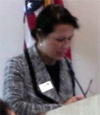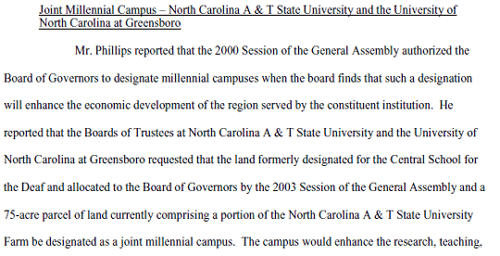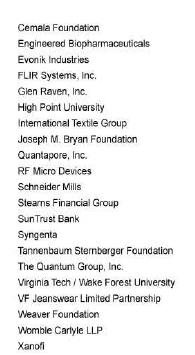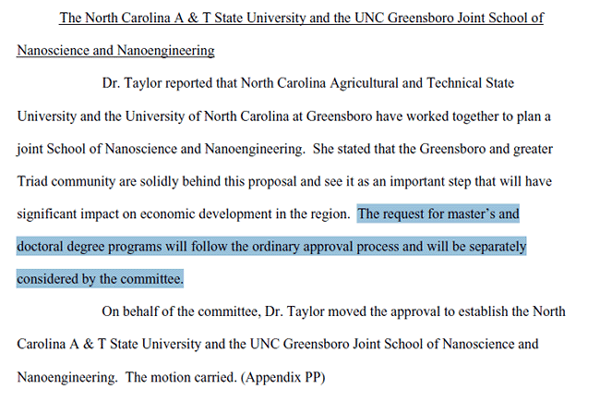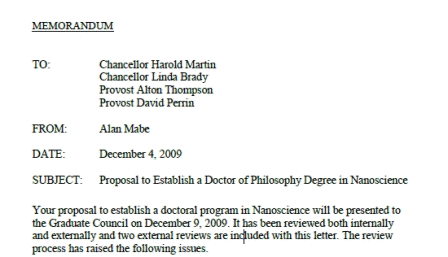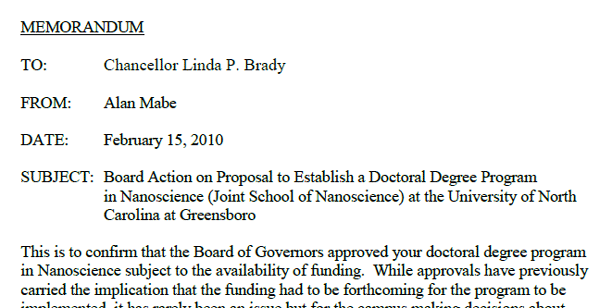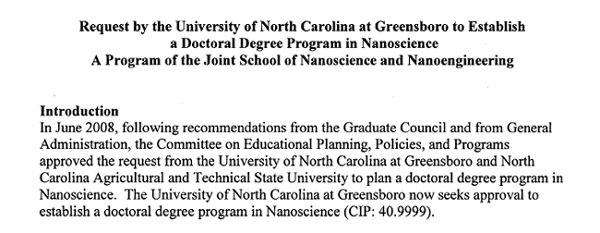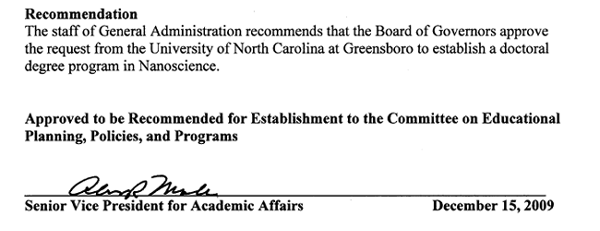 Throw in with the devil, get thrown in with the devil;
Never-Trump Throw in with the devil, get thrown in with the devil;
Never-Trump
The LORD is my
Sheppard Jesus (Michael J. Pippen since 1949) & wingmen
Archangels Michael and Gabriel to plow the road.
09.02.21 |
|
|
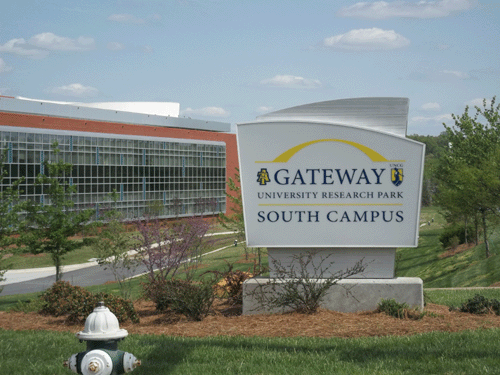 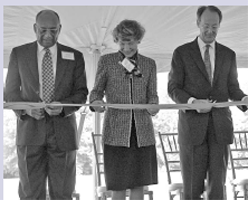 " I
am so energized by the potential of this research
park, in particular the joint schools of nano
technology and nano science. The world is seeing
explosive growth today in the commercialization of
nanotechnology. We will have all of the assets right
here in Guilford County that we need to participate
in that explosion, and they will be right here at the Gateway
University Research Park." said Erskine president
of the University of North Carolina system. Photo NC
A&T " I
am so energized by the potential of this research
park, in particular the joint schools of nano
technology and nano science. The world is seeing
explosive growth today in the commercialization of
nanotechnology. We will have all of the assets right
here in Guilford County that we need to participate
in that explosion, and they will be right here at the Gateway
University Research Park." said Erskine president
of the University of North Carolina system. Photo NC
A&T |
 Bowles
appointee Interim NC A&T Chancellor Lloyd V. Hackley and
UNCG Chancellor made Request to Establish The JSNN
March 7, 2007. Bowles
appointee Interim NC A&T Chancellor Lloyd V. Hackley and
UNCG Chancellor made Request to Establish The JSNN
March 7, 2007. |
|
|
|
UNC Board of Governors UNC Greensboro white privilege Nanoscience Degrees |
|
Fraudulent claiming HBCU NC A&T and HWI UNCG were
partners in NCGS:
116-198.34. (8b) NC
A&T/UNCG Joint
Millennial Campus. May 2007 UNC Board of Governors
established alleged Joint School of Nanoscience and
Nanoengineering, at de
facto NC
A&T / UNCG Joint Millennial Campus, UNCG affiliate,
Gateway University |
|
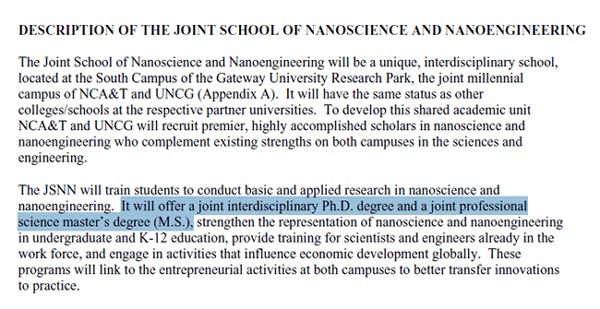 |
|
Research
Park, Inc.; to
offer (a) joint interdisciplinary Ph.D. degree and (a)
joint professional science master's degree. |
|
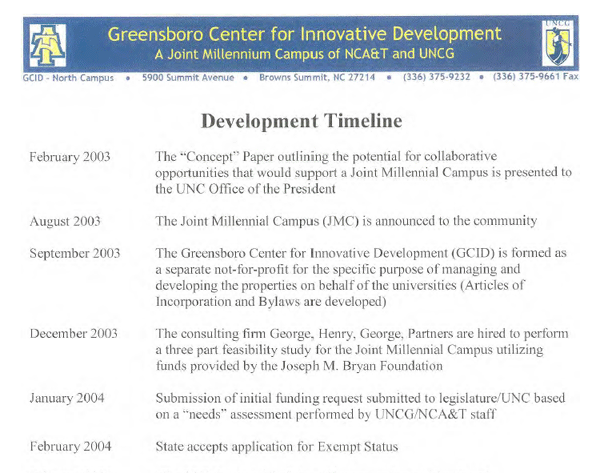 |
| Greensboro Center for Innovative
Development, alleged Joint Millennial
Campus, Development timeline from Feb-03 to
April-06 does not indicated designation of
NC A&T/UNCG Joint Millennial Campus. link |
|
|
 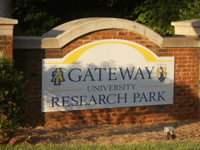 No statuary NCGS:
116-198.34. (8b) NC A&T/ UNCG Joint
Millennial Campus was designated Oct.
2003 enabling Greensboro Center for Innovative Development, Inc.
to administer the educational, research, and economic
development mission of a Joint Millennial Campus. No
lawful leased was executed by Board of Governors to the
Greensboro Center for Innovative Development, Inc. for
Session Law 2003-284, Section 6.20, land and facilities and 75-acre
parcel of NC A&T Farmland.
Link
No statuary NCGS:
116-198.34. (8b) NC A&T/ UNCG Joint
Millennial Campus was designated Oct.
2003 enabling Greensboro Center for Innovative Development, Inc.
to administer the educational, research, and economic
development mission of a Joint Millennial Campus. No
lawful leased was executed by Board of Governors to the
Greensboro Center for Innovative Development, Inc. for
Session Law 2003-284, Section 6.20, land and facilities and 75-acre
parcel of NC A&T Farmland.
Link |
|
|
The National Center for Educational
Statistics (NCES) responsible for collecting and presenting
statistical data and information for the nation; classifies
Nanoscience and Nanoengineering as Nanotechnology CIP 15.1601:
Engineering technologies and Engineering related fields.
|
For Liberal Arts UNC Greensboro with doctorial programs in music and
nursing to offer Nanoscience degrees requires access to NC A&T
academic programs and research: “Although the degree is in
Nanoscience (does not include Nanoengineering),

students will be given the opportunity to take relevant courses at
the School of Engineering at North Carolina A&T University and
must be able to work on collaborative projects with faculty in the
School of Engineering. |
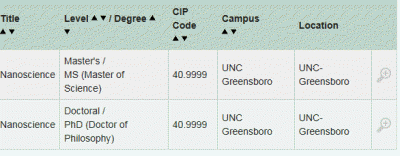 Excluding
NC A&T,
The
University of North Carolina
Board of Governors authorized
HWI UNC Greensboro Nanoscience
MS on November 13, 2009 and PhD
program in Nanoscience on
January 8, 2010 requiring UNCG
students take relevant courses
at the School of Engineering at
North Carolina A&T University
and be able to work on
collaborative projects with
faculty in the School of
Engineering” Excluding
NC A&T,
The
University of North Carolina
Board of Governors authorized
HWI UNC Greensboro Nanoscience
MS on November 13, 2009 and PhD
program in Nanoscience on
January 8, 2010 requiring UNCG
students take relevant courses
at the School of Engineering at
North Carolina A&T University
and be able to work on
collaborative projects with
faculty in the School of
Engineering” |
|

|
|
Responding to a Public
records request to Dr. David H. Perrin UNCG
Provost & Executive Vice Chancellor,1/7/11,
for a copy of an UNCG chancellor signed
request to establish stand alone Masters and
PhD Nanoscience degrees at UNCG, Counsel
Steve Serck responded "In
response to your request of 1/7/11, no such documents as you
described exists."
Unambiguous
lack of UNCG Chancellor
Dr. Linda Brady signed Proposals requesting
to establish Nanoscience Professional Master
of Science in Nanoscience and Ph.D.
Nanoscience clearly demonstrated UNCG had
not expressed intentions to establish
the degrees, they had not been approved by
the faculty and administration, and were not
pursuant UNC Policies 400.1.1,1[G]and
400.1.1.5[G], and did not officially
originate from UNC Greensboro. |
|
|
|
A degree program is a program of study in
a discipline specialty that leads to a
degree in that distinct specialty area at a
particular level of instruction. As a
general rule, in order to be considered for
degree program status, a course of study
should require at least 27 semester hours in
the proposed program area at the
undergraduate level; at least half the
number of hours required for the degree at
the master’s level; and at least 21 hours in
the proposed program area at the doctoral
level. [Adopted
05/06/09] |
|
Notwithstanding the
National Center for
Educational
Statistics (NCES),
categorized
Nanoscience as CIP
15.1601 Engineering
Technologies and
Engineering-Related
Fields. UNC
General
Administration
applied CIP
40.9999 (Physical
Science) to UNCG
academic offering . Note
UNC-G has a School
of Arts and
Science. |
 |
|
| Note Fall
2005 UNC Presidency transition
from President
Molly Broad to
Erskine Bowles. |
|
Doctor of Philosophy in Nanoscience
The PhD in Nanoscience requires a minimum of
60 hours and is designed to prepare students
to take positions in industrial,
governmental, or academic research settings
by providing a solid background in
Nanoscience theory and experimental
techniques through course work and
dissertation research. |
|
Erskine Bowles UNC
General Administration categorizing
Nanoscience Ph.D. as a Physical
Science; examining UNC Greensboro
curricula for similar Physical
Science Ph.D. programs
determined: |
 |
UNC
Greensboro offer no
similar Ph.D.
programs.
|
|
|
|
United States v.
Fordice, 505 U.S. 717 (1992)
a United States Supreme Court
case that resulted in an eight
to one ruling that the eight
public universities in
Mississippi had not sufficiently
integrated and that the state
must take affirmative action to
change this under the Equal
Protection Clause and Title
VI. This
is not a legal setting but
context comparison UNC BOG &
SOCS policies in light of the
selected text held in UNITED
STATES v. FORDICE, GOVERNOR OF
MISSISSIPPI :
|
|
..If the State perpetuates
policies and practices traceable
to its prior de jure dual system
that continue to have
segregative effects ...implicit
in the court’s finding of
“unnecessary” duplication is the
absence of any educational
justification ....and such
policies are without sound
educational justification and
can be practicably eliminated,
implicated the Equal Protection
clause... , emphasis added. |
|
|
When all of the
occupations which will be affected by
nanotechnology will require a BS in
engineering with a broad, interdisciplinary
and multi-disciplinary approach; will
require an understanding not only of
electrical, mechanical and civil
engineering, but biology, physics and
chemistry as well.
Why is
across-town Liberal Art UNC Greensboro with
programs in music and nursing, requiring
relevant courses be taken at the School of
Engineering at North Carolina A&T University
and will be able to work on collaborative
projects with faculty in the School of
Engineering”, except
for unvarnished racism offering Nanoscience
degrees? |
|
| |
Reported in the media: UNC-Greensboro Board of
Trustees Nov. 2, 2006, approved budget request part of
a 19-page proposal outlining plans for the nanotech
program scheduled to go before trustees at A&T Nov.
15. The school, as it is proposed, would offer a
doctorate in Nanoscience and Nanoengineering and a
professional science master's program, emphasis
added. Officials from both A&T and UNC-G
 declined
to comment on the proposal because it had not yet been
presented to the A&T trustees. It must be approved by
both schools before it can be submitted to the UNC
General Administration for evaluation. “ [5] declined
to comment on the proposal because it had not yet been
presented to the A&T trustees. It must be approved by
both schools before it can be submitted to the UNC
General Administration for evaluation. “ [5] |
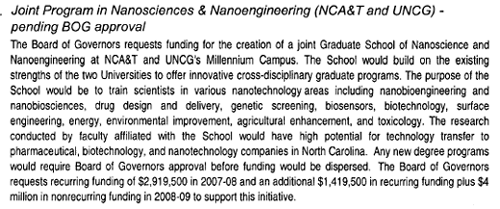 Not
with standing NCA&T board of Trustees had not met.
Subject of a policy discussion UNC Board of Governors
2007-2009 Budget Priorities November 10, 2006 called for
Pending Board of Governors approval, funding for the
creation of a joint Graduate School of Nanoscience and
Nanoengineering at NC A&T and UNC-G's Millennium Campus Not
with standing NCA&T board of Trustees had not met.
Subject of a policy discussion UNC Board of Governors
2007-2009 Budget Priorities November 10, 2006 called for
Pending Board of Governors approval, funding for the
creation of a joint Graduate School of Nanoscience and
Nanoengineering at NC A&T and UNC-G's Millennium Campus |
| UNC BOG Committee on Budget and Finance,
April 2006, approved recommending 1.3
million dollars for planning a Biotechnology
Building at NC A&T to full BOG. Proposed
facility would enable NC A&T to support
ongoing and expanding research activities in
bioengineering, biotechnology, and
biomedicine. NC A&T' biotechnology program
is interdisciplinary and will |
|
 |
| UNC Board of Governors 2007-09 budget
Priorities bogus claim the Greensboro Center
for Innovative Development- renamed Gateway
University Research Park- as NC AT/UNC-G
Joint Millennial Campus proposal called for
relocating NC A&T College of
Engineering, School of Technology, Physical
Sciences and Applied Sciences programs and
research, off –campus to the bogus Joint
Millennial (with UNCG) doubling the cost $25
million vs. $50 million |
|
 Bowles
appointee Interim NC A&T Chancellor Lloyd V. Hackley and
UNCG Chancellor made the Request to Establish The JSNN
March 7, 2007. Bowles
appointee Interim NC A&T Chancellor Lloyd V. Hackley and
UNCG Chancellor made the Request to Establish The JSNN
March 7, 2007. |
|
|
|
Fraudulent claiming HBCU NC A&T and HWI UNCG were
partners in NCGS:
116-198.34. (8b) NC
A&T/UNCG Joint
Millennial Campus. May 2007 UNC Board of Governors
established alleged Joint School of Nanoscience and
Nanoengineering, at de
facto NC
A&T / UNCG Joint Millennial Campus, UNCG affiliate,
Gateway University |
|
 |
|
Research
Park, Inc.; to
offer (a) joint interdisciplinary Ph.D. degree and (a)
joint professional science master's degree. |
|
| |
|
|
|
|
| UNC System General
Administration is not a constituent university in the
UNC System. The Millennial Campus Statue does
not provide for the The Board of Governors to designate
a General Administration NC G. S.: 116-198.34. (8b)
Joint Millennial Campus. UNC Policy
Manual 600.1.3 limits the President to acquisition of
Real Property to $25,000 or less without Board of
Governors approval and any proposal involving the
acquisition or disposition by the institution of any
interest in real property shall be recommended by the
Board of Trustees. |
| |
 |
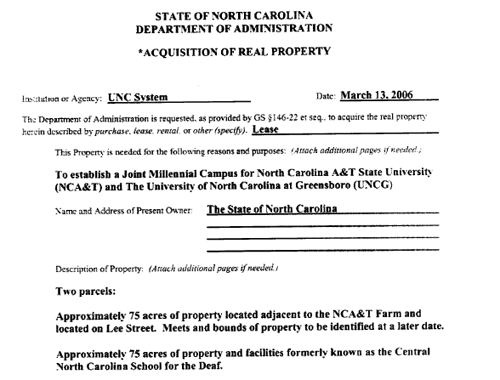 |
|
Erskine
Bowles UNC System Acquisition of Real
Property by lease P0-1 dated March 13, 2006
for the purpose of establishing a Joint
Millennial Campus for North Carolina A&T |
| |
State University and The
University of North Carolina
Greensboro. Proposed Lease unequivocal
extinguished UNC Board of Governors
alleged Joint Millennial Campus - North
Carolina A&T State  University
and the University of North Carolina
Greensboro - false claim Oct. 10, 2003
designation of the Central School of the
Deaf reallocated to the Board of Governors
and 75-acre parcel on NCA&T farmland as
Joint Millennial Campus.
No NCA&T/UNCG JMC University
and the University of North Carolina
Greensboro - false claim Oct. 10, 2003
designation of the Central School of the
Deaf reallocated to the Board of Governors
and 75-acre parcel on NCA&T farmland as
Joint Millennial Campus.
No NCA&T/UNCG JMC |
|
|
Millennial Campus Statue] §
116-198.34. General powers of Board of Governors.
The Board may exercise any one or more of the following
powers: (1) To determine the location and character of
any project or projects, and to acquire, construct, and
provide the same, and to maintain, repair, and operate,
and to
enter into contracts for the management, lease, use, or
operation of all or any portion of any project or
projects and any existing facilities. |


Notwithstanding Erskine Bowles
General Administration
submission of Acquisition of
Real Property PO-1, dated March
16, 2006, to Department
of Administration, State
Property Office for the purpose
to establish Joint Millennial
Campus for NCA&T and UNCG;
claiming this action has been
approved by NCA&T and UNCG Board
of Trustees. |
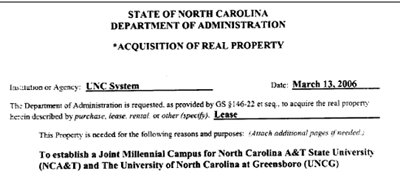 |
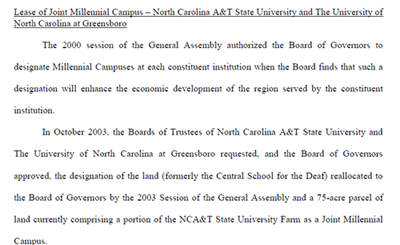 |
| |
|
The
Bowles Administration May
2006, recommended
approval of UNC BOG document
Lease of Joint Millennial Campus
– North Carolina A&T
State University and The
University of North Carolina at
Greensboro, containing known
false claim:
|
-
The Board of Governors
approved, the designation of
the land (formerly the
Central School for the Deaf)
reallocated to the Board of
Governors by the 2003
Session of the General
Assembly and a 75-acre
parcel of land currently
comprising a portion of the
NCA&T State University Farm
as a Joint Millennial
Campus,
-
Now, the Boards of Trustees
of NCA&T and UNCG are
requesting permission to
execute a ground lease of
the land and existing
improvements for the Joint
Millennial Campus to the
Greensboro Center for
Innovative Development, a
jointly-controlled and
jointly-funded 501(c) (3)
entity that will administer
the educational, research,
and economic development
mission of the Joint
Millennial.
|
|
|
|
  Unambiguous
no statuary NCGS:
116-198.34. (8b) NC A&T/ UNCG Joint
Millennial Campus was designated Oct.
2003 enabling Greensboro Center for Innovative Development, Inc.
to administer the educational, research, and economic
development mission of a Joint Millennial Campus. No
lawful leased was executed by Board of Governors to the
Greensboro Center for Innovative Development, Inc. for
Session Law 2003-284, Section 6.20, land and facilities and 75-acre
parcel of NC A&T Farmland.
Link Unambiguous
no statuary NCGS:
116-198.34. (8b) NC A&T/ UNCG Joint
Millennial Campus was designated Oct.
2003 enabling Greensboro Center for Innovative Development, Inc.
to administer the educational, research, and economic
development mission of a Joint Millennial Campus. No
lawful leased was executed by Board of Governors to the
Greensboro Center for Innovative Development, Inc. for
Session Law 2003-284, Section 6.20, land and facilities and 75-acre
parcel of NC A&T Farmland.
Link |
| |
|
 |
The National Center for Educational
Statistics (NCES) responsible for collecting and presenting
statistical data and information for the nation; classifies
Nanoscience and Nanoengineering as Nanotechnology CIP 15.1601:
Engineering technologies and Engineering related fields.
|
|
Nanotechnology. Definition:
A program that prepares individuals to apply mathematical,
scientific, and engineering principles and technical skills to
manipulate matter at the atomic and molecular level (in the range of
1-100 nanometers) and to design, fabricate, and integrate nanoscale
structures, devices, and systems.
Includes instruction in materials science, thermodynamics,
nanomaterials, Nano electronics, and nano/micro device fabrication
and testing. [https://nces.ed.gov/search/?q=nano+science] |
|
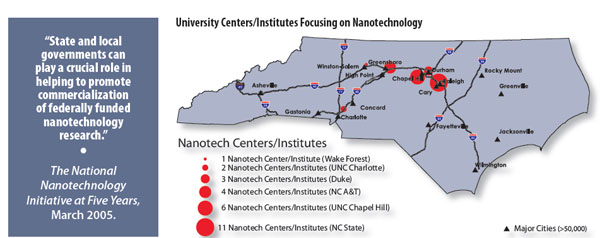
 Historical
Black Land Grant NC A&T was listed as University focus on
Nanotechnology May 2005. Historical
Black Land Grant NC A&T was listed as University focus on
Nanotechnology May 2005.
Cross town Historical White UNC Greensboro was not listed
as a University focused on Nanotechnology. |
| |
|
 |
 |
|
PCG/UNC-NCCCS/UNC Interim report
3.doc/RB.SP.PC.CR.ATPCC.1/CC.14/10May05 |
|
|
 |
|
University of North Carolina at Greensboro
2007-2008 Profile |
|
|
Historical black North
Carolina A&T, as one of the state's two land grant
institutions, has programs through the doctoral level. Its
programs include engineering, arts and sciences,
agricultural and environmental sciences, business and
economics, education, nursing, technology, and graduates
studies. “The expected roles of a land-grant institution, is
teaching agriculture and engineering, and providing
cooperative extension services” . |
 |
|
For Liberal Arts UNC Greensboro with doctorial programs in music and
nursing to offer Nanoscience degrees requires access to NC A&T
academic programs and research: “Although the degree is in
Nanoscience (does not include Nanoengineering),

students will be given the opportunity to take relevant courses at
the School of Engineering at North Carolina A&T University and
must be able to work on collaborative projects with faculty in the
School of Engineering. |
|
UNC Board of Governors January 2007 authorized UNC
Charlotte, which has an Engineering School, to offer a
Ph.D. in Nanoscale Science. Offering Nanoscale
Science was not a Substantial Change as defined by
the SACS for UNC Charlotte. Nov. 2012 UNC Board of
Governors authorized a Master’s in Nanoengineering to
Land Grant Institution NC State, which has an
Engineering. Offering Nanoengineering was not a
Substantial Change as defined by the SACS for NC State.
Consistent with other engineering schools in the UNC
System offering Nanoscience and Nanoengineering
(Material Science) programs are
not Substantial Changes as defined by the SACS and consistent
with the education, curricular, mission and goals of NC
A&T State University. No liberal arts school offered
Nanotechnology degrees in the UNC System |
| |
 |
|
| |
|
| Dr. Alan Mabe
Senor Vice President for Academic Affairs April
28, 2009 to Ed Planning, Ph.D. Memorandum
degree proposals indicate NC A&T plan to offer
Nanoscience and Material Science
(Nanoengineering). |
|
|
|
Unlike land grant cross-town historical Black NCA&T with strong
programs in engineering offering Nanoscience constituted a
Substantive Change as defined by SACS from previous approved
circular at historical white women UNCG with strong programs in
liberal Arts. (UNCG) Rebecca Adams to (SACS) Tom Benberg: Sarah
Armstrong Subject: Request for interpretation of accuracy of
nanoscience message, April 13, 2010:
The bottom line, however, is that we need to submit a full
prospectus and need to do so as soon as possible. This request will
be for approval to initiate a new off-campus site (South Campus) and
to initiate a new degree program (MS in Nanoscience) at that site. Contrary
to previous interpretations, both represent substantive changes..
Due to the confusion, they are willing to waive the requirement that
we do so 6 months in advance and will usher it though the approval
process in a timely way so that we can accept students into UNCG's
MS in Nanoscience program next fall. |
| |
|
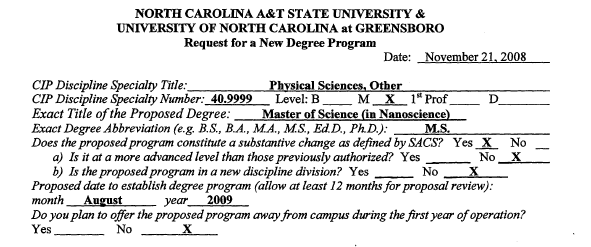 |
|
NCA&T/UNCG submitted Joint Request
for authorization to Establish”
Ph.D. in Nanoscience” dated Oct. 10,
2008 to UNC General Administration
and Joint Request for authorization
to establish “Master of Science (in
Nanoscience)” dated Nov. 21, 2008
to UNC General Administration. |
|
|
|
| |
UNC Policy for Interdisciplinary
Degree

An Interdisciplinary Degree program involves two or more
academic units, either on the same or
different campuses in a formal agreement to offer a
program of study drawing on two or more disciplines that
will result in a student being awarded an
interdisciplinary degree. If more than one campus is
involved in offering the program it would also be a
joint degree. |
| |
|
Contractual Agreement –
typically is one in which an institution enters an
agreement for receipt of courses/programs or portions of
courses or programs (i.e., clinical training
internships, etc.) delivered by another institution or
service provider. [SUBSTANTIVE CHANGE FOR SACSCOC
ACCREDITED INSTITUTIONS Policy Statement]. Therefore a Contractor,
institution or service provider enters into an
agreement to provide courses/programs or portions of
courses or program |
| |
|
 |
| JSNN
Management Agreement March 3, 2008: Article
5. Degrees.
Degrees will be awarded jointly NCA&T and UNCG; Article
1: Mission and Organizing Principles.
NCA&T and UNCG are committed to the principle that the
JSNN is a shared academic unit of the two institution in
terms of governance, faculty, students, curriculum,
and management; constitute Collaborative academic
arrangements are agreements between institutions
purposes of awarding academic credits and/or educational
program completion credentials, e.g., certificates,
diplomas, degrees or transcripts. |
|
United States v. Fordice, 505 U.S. 717 (1992)
a United States Supreme Court case that resulted in an
eight to one ruling that the eight public universities
in Mississippi had not sufficiently integrated and that
the state must take affirmative action to change this
under the Equal Protection Clause and Title VI. This
is not a legal setting but context comparison UNC BOG &
SOCS policies in light of the selected text held in
UNITED STATES v. FORDICE, GOVERNOR OF MISSISSIPPI :
|
|
..If the State perpetuates policies and practices
traceable to its prior de jure dual system that continue
to have segregative effects ...implicit in the
court’s finding of “unnecessary” duplication is the
absence of any educational justification ....and
such policies are without sound educational
justification and can be practicably eliminated,
implicated the Equal Protection clause... , emphasis
added. |
|
When all of the occupations which will be
affected by nanotechnology will require a BS in
engineering with a broad, interdisciplinary and
multi-disciplinary approach; will require an
understanding not only of electrical, mechanical
and civil engineering, but biology, physics and
chemistry as well.
 |
|
Why is across-town Liberal Art UNC Greensboro
with programs in music and nursing, requiring
relevant courses be taken at the School of
Engineering at North Carolina A&T University and
will be able to work on collaborative projects
with faculty in the School of Engineering”, except
for unvarnished racism offering Nanoscience
degrees? |
|
|
|
 Harold
Martin, Rob Nelson, Alan Mabe,
email dated December 09, 2008, Subject Joint Millennial
Campus to: Provosts Perrin and Thompson UNCG and NCA&TSU ,
attachment Second
Document Page 9 UNC GA/Questions from UNC General
Administration’s notes
the March 3, 2008 Memorandum (Management Agreement) needs to
be revised, updated and reapproved. Harold
Martin, Rob Nelson, Alan Mabe,
email dated December 09, 2008, Subject Joint Millennial
Campus to: Provosts Perrin and Thompson UNCG and NCA&TSU ,
attachment Second
Document Page 9 UNC GA/Questions from UNC General
Administration’s notes
the March 3, 2008 Memorandum (Management Agreement) needs to
be revised, updated and reapproved. |
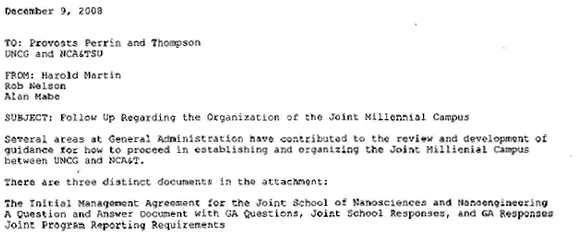 |
 |
Reported in the media: UNC-Greensboro
Board of Trustees Nov. 2, 2006, approved budget
request part of a 19-page proposal outlining plans
for the nanotech program scheduled to go before
trustees at A&T Nov. 15. The school, as
it is proposed, would offer a doctorate in
Nanoscience and Nanoengineering and a professional
science master's program, emphasis added. Officials
from both A&T and UNC-G
 declined
to comment on the proposal because it had not yet
been presented to the A&T trustees. It must be
approved by both schools before it can be submitted
to the UNC General Administration for evaluation. “ [5]
. The
College [College of Arts and Sciences] was a central
player in the continuing work to establish the Joint
School of Nanoscience and Nanoengineering with NC
A&T University. Degrees or programs being considered
for the future· MS in Nanoscience and Ph.D. in
Nanoscience. [UNC-G Curricular Planning, Academic
Affairs Annual Report AY 2007/08] declined
to comment on the proposal because it had not yet
been presented to the A&T trustees. It must be
approved by both schools before it can be submitted
to the UNC General Administration for evaluation. “ [5]
. The
College [College of Arts and Sciences] was a central
player in the continuing work to establish the Joint
School of Nanoscience and Nanoengineering with NC
A&T University. Degrees or programs being considered
for the future· MS in Nanoscience and Ph.D. in
Nanoscience. [UNC-G Curricular Planning, Academic
Affairs Annual Report AY 2007/08] |
|
|
 |
|
Erskine
Bowls UNC
General
Administration,
approved Amended
and Restated
Management
Agreement (April
2009) in
part
altered
JSNN March
03, 206
Management
Agreement
Mission from
offering
joint
interdisciplinary
Ph.D. degree
and joint
professional
science
master's
degrees; to
offering
(stand-alone)
interdisciplinary
Master of
Science and
Ph.D.
degrees and
a
Professional
Master of
Science in
Nanoscience
degree. |
 |
|
|
Organizing
Principles.
NCA&T and
UNCG are
committed to
the
principle
that the
JSNN is a
shared
academic
unit of the
two
institutions
in terms of
governance
and
management
-explicitly
- removing
shared
academic
unit.
UNCG will be
the home
institution
for
nanoscience
faculty,
students and
the
nanoscience
curriculum
and degree
programs.
.NC A&T will
be the home
institution
for
nanoengineering
faculty,
students and
the
nanoengineering
curriculum
and degree
programs. |
|
Amended
and restated JSNN
Management
Agreement: Article 5
Degrees.
Nanoengineering
degrees will be
awarded by NC A&T.
Nanoscience degrees
will be awarded
UNCG. Organizing
Principle. NCA&T and
UNCG are committed
to the principle
that the JSNN is a
shared academic unit
of the institutions
in terms of
governance and
management, explicit
removed curriculum
from management
agreement ceasing to
be a collaborative
academic for
receipt of
courses/programs or
portions of courses
or programs between
NCA&T and UNCG,
without which no
academic foundation
for UNC Greensboro
to offer Engineering
technologies and
Engineering related
fields. |
| |
|
The UNC
Policy
Manual 400.1
Adopted
05/06/09 |
 |
|
Amended and
Restated
Agreement
April 24,
2009
curricular/
Degrees NC
A&T will
offer
Nanoengineering
degrees and
UNCG will
offer
Nanoscience
degrees,
inconsistent
with UNC
Board of
Governors
May 2007
JSNN to
offer to
offer (a)
joint
interdisciplinary
Ph.D. degree
and (a)
joint
professional
science
master's
degree was ultra
vies of the
General
Administration
authority. |
| |
| Notwithstanding May
2007 UNC Board of Governors established
alleged Joint School of Nanoscience and
Nanoengineering, at bogus NC A&T / UNCG
Joint Millennial Campus, UNCG affiliate,
Gateway University Research Park, Inc. to
offer (a) joint interdisciplinary Ph.D.
degree and (a) joint professional science
master's degree. |
 The
University of North Carolina
Board of Governors authorized
HWI UNC Greensboro Nanoscience
MS on November 13, 2009 and PhD
program in Nanoscience on
January 8, 2010 requiring UNCG
students take relevant courses
at the School of Engineering at
North Carolina A&T University
and be able to work on
collaborative projects with
faculty in the School of
Engineering”. The
University of North Carolina
Board of Governors authorized
HWI UNC Greensboro Nanoscience
MS on November 13, 2009 and PhD
program in Nanoscience on
January 8, 2010 requiring UNCG
students take relevant courses
at the School of Engineering at
North Carolina A&T University
and be able to work on
collaborative projects with
faculty in the School of
Engineering”. |
|
|
 |
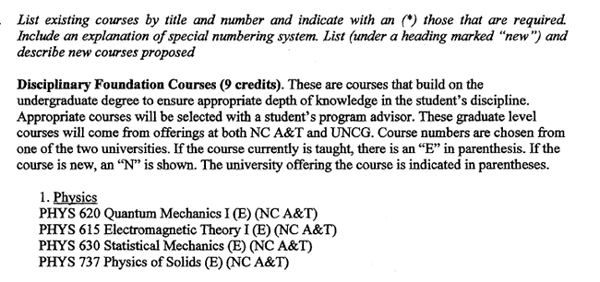 |
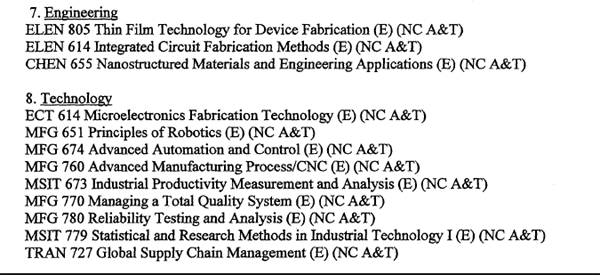 |
 |
|
Excluding (The) North Carolina Agricultural
and Technical State university from
offering MS and PhD Nanoscience degrees,
forcing the HBCU out of the JSNN Mission to
offer (a)
joint interdisciplinary Ph.D. degree and (a)
joint professional science master's degree.
And depriving NC A&T benefit Nanoscience
funding. See UNC Greensboro white Privilege
Nanoscience degrees |
|
|
|
|
UNC Board
of Governors
Minutes May
2006 |
|
|
|
|
The North Carolina A&T
State University and the UNC
Greensboro Joint School of
Nanoscience and Nanoengineering.
Dr. Priscilla P. Taylor (Cemala
Foundation) reported that
the Greensboro and greater Triad
community are solidly behind
this proposal and see it as an
important step that will have
significant impact on economic
development in the region. The
master's and doctoral degree
programs will follow the
ordinary approval process and
will be separately considered by
the committee.
|
|
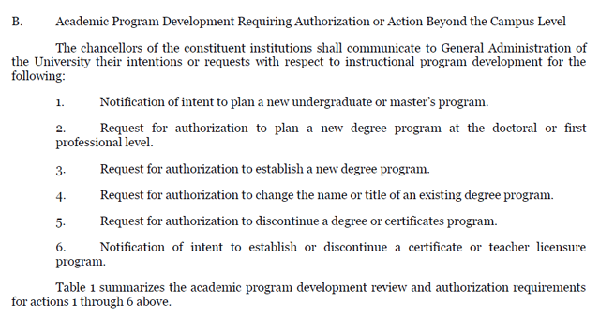 |
|
The UNC
Policy Manual 400.1.1.1[G]
Adopted 05/06/09 |
|
|
The
Chancellor signature certifies proposal [UNC
Policy Manual 400.1.5(G)] to establish new
degree program was reviewed and approved by
the appropriate campus committees and
authorities. |
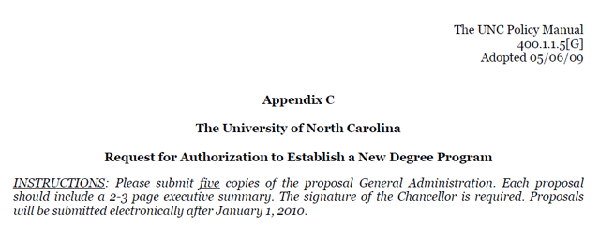 |
 |
Responding to a Public
records request to Dr. David H. Perrin UNCG
Provost & Executive Vice Chancellor,1/7/11,
for a copy of an UNCG chancellor signed
request to establish stand alone Masters and
PhD Nanoscience degrees at UNCG, Counsel
Steve Serck responded "In
response to your request of 1/7/11, no such
documents as you described exists." |
| |
|
Unambiguous
lack of UNCG Chancellor
Dr. Linda Brady signed Proposals requesting
to establish Nanoscience Professional Master
of Science in Nanoscience and Ph.D.
Nanoscience clearly demonstrated UNCG had
not expressed intentions to establish
the degrees, they had not been approved by
the faculty and administration, and were not
pursuant UNC Policies 400.1.1,1[G]and
400.1.1.5[G], and did not officially
originate from UNC Greensboro. |
|
|
|
 |
|
A degree program is a
program of study in a discipline specialty
that leads to a degree in that distinct
specialty area at a particular level of
instruction. As a general rule, in order
to be considered for degree program status,
a course of study should require at least 27
semester hours in the proposed program area
at the undergraduate level; at least half
the number of hours required for the degree
at the master’s level; and at least 21 hours
in the proposed program area at the doctoral
level. [Adopted
05/06/09] |
|
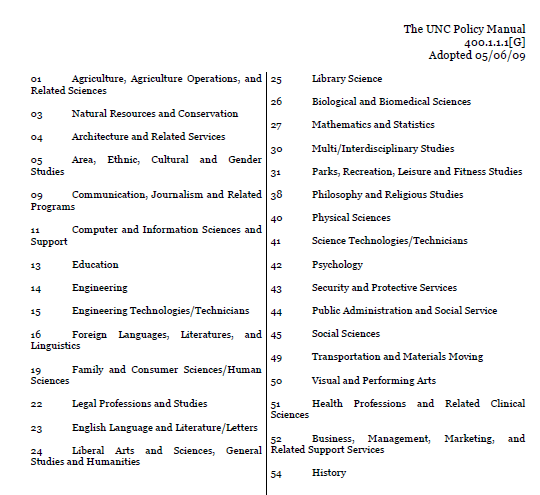 |
 |
|
|
|
|
The National
Center for Educational Statistics (NCES)
responsible for collecting and presenting
statistical data and information for the
nation; classifies Nanoscience and
Nanoengineering as Nanotechnology CIP
15.1601: Engineering technologies and
Engineering related fields. |
|
Elizabeth City State University requested
authorization to establish a BS in
Engineering Technology (CIP 15.9999)
in January 2006. The proposed degree will
offer concentrations in “Computer and
Information Technology” and “Mechanical and
Automation.” The program will be housed in
the Department of Technology, which
currently offers BS degrees in Industrial
Technology and Aviation Science. The
proposed program will incorporate some
existing industrial technology and computer
courses into the curriculum. UNC Board of
Governors 8/11/06 authorize BS Engineering
Technology CIP 15.999 to in 2006 Elizabeth
City State |
|
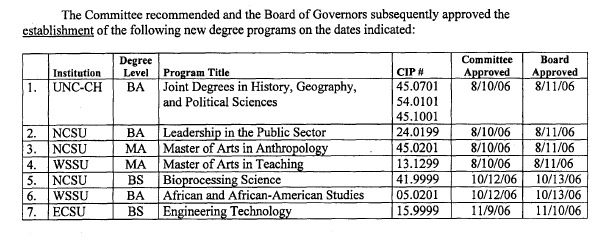 |
|
|
|
|
Notwithstanding the
National Center for
Educational Statistics (NCES),
categorized Nanoscience
as CIP 15.1601
Engineering Technologies
and Engineering-Related
Fields. UNC
General Administration
applied CIP
40.9999 (Physical
Science) to UNCG
academic offering . Note
UNC-G has a School of
Arts and Science. |
 |
|
| Note Fall
2005 UNC Presidency transition from President
Molly Broad to
Erskine Bowles. |
|
Professional Master of Science in
Nanoscience
The 33-hour, non-thesis MS in
Nanoscience follows the Professional
Master of Science degree model,
featuring course work in Nanoscience
and business and an internship to
provide practical experience. |
| |
 |
UNC General
Administration applied CIP
40.9999 (Physical
Science) to UNCG
academic offering determined
UNC at Greensboro offered
only a Master in
Chemistry on the
graduate level in the
category of Physical
Science. |
| |
|
Unambiguous a degree in
Chemistry is not a
degree in Nanoscience.
UNC Greensboro academic
inventory was
substantially below the
general rule of at
least half the number of
hours required for
discipline
[Nanoscience] degree at
the master’s level. |
|
|
|
| |
Doctor of Philosophy in Nanoscience
The PhD in Nanoscience requires a minimum of
60 hours and is designed to prepare students
to take positions in industrial,
governmental, or academic research settings
by providing a solid background in
Nanoscience theory and experimental
techniques through course work and
dissertation research. |
| |
|
 |
The PhD program will include
a core interdisciplinary curriculum that
provides a thorough background in the
principles and tools required for a research
career in Nanoscience. Program will
include a core interdisciplinary curriculum
that provides a thorough background in the
principles and tools required for a research
career in Nanoscience. Student's will take
additional elective course related to their
research and professional interests.
Admission to the program will required and
undergraduate or maser's degree in an
appropriate science or engineering
disciplined as well as acceptable test
scores.
|
|
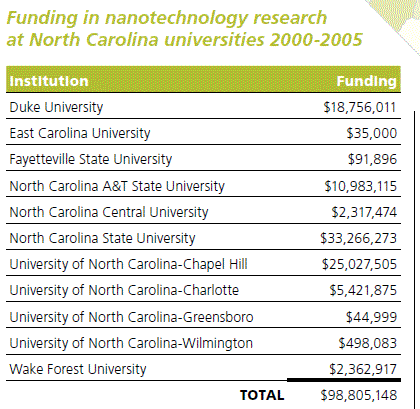 ”The
addition of a doctoral program is not an easy or simple
extension of the master’s program. Unlike most master’s
programs, a doctoral program is research-based. While
doctoral program requirements routinely include
additional course work, the central program requirement
is the dissertation. The topic for the dissertation
normally derives from discussion with faculty who are
engaged in research and therefore knowledgeable about
the “frontier of knowledge” in the discipline. For a
faculty member to then properly guide and assist the
student’s dissertation research, that faculty member
must be an active researcher. Hence, the
implementation of a doctoral program must be preceded by
the assembling of faculty who are conducting publishable
research in that discipline. UNIVERSITY
OF NORTH CAROLINA PROGRAM DUPLICATION STUDY Submitted by
James H. Woodward November 1, 2011 p12] ”The
addition of a doctoral program is not an easy or simple
extension of the master’s program. Unlike most master’s
programs, a doctoral program is research-based. While
doctoral program requirements routinely include
additional course work, the central program requirement
is the dissertation. The topic for the dissertation
normally derives from discussion with faculty who are
engaged in research and therefore knowledgeable about
the “frontier of knowledge” in the discipline. For a
faculty member to then properly guide and assist the
student’s dissertation research, that faculty member
must be an active researcher. Hence, the
implementation of a doctoral program must be preceded by
the assembling of faculty who are conducting publishable
research in that discipline. UNIVERSITY
OF NORTH CAROLINA PROGRAM DUPLICATION STUDY Submitted by
James H. Woodward November 1, 2011 p12]
NCA&T was 4th in Funding in
Nanotechnology Research at North Carolina Universities
with $11 Million Dollars between 2000-2005. UNC at
Greensboro 10th among the 11 institutions conducted
$45,000 dollars of Nanotechnology research between 2000
thru 2005.
|
Nanotechnology is Experimental
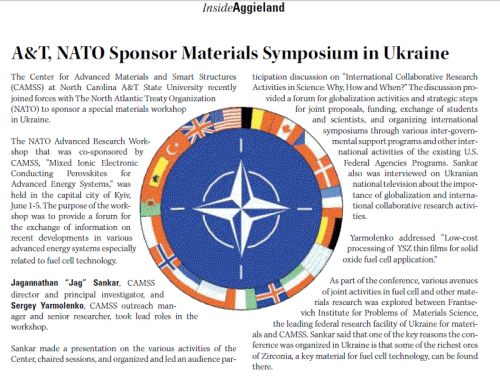 NCA&T
State University has been funded at an average rate of
$3-5 million per year in the area of nanoscience and
nanotechnology. Most of the research in nanoengineering
is done in the Center for Advanced Materials and Smart
Structures (CAMSS). Several Centers and projects are
under CAMSS, including the NSF Center for Research
Excellence in Science and Technology (CREST), the DoD
Center for Nanoscience, Nanomaterials and
Multifunctional Materials (CNN) for Homeland Security,
the NSF Nanoscale Science and Engineering Center (NSEC),
the NSF project on US/Europe Materials Collaboration:
Self-Organized Nanostructured Thin Films for Catalysis,
the NSF project on Nanoscale Interdisciplinary Research
Teams (NIRT), the NSF Major Research Instrumentation for
Nanoengineering Research, and the NSF Nanotechnology
Undergraduate Education (NUE) program. CAMSS also
facilitates many of the materials research activities of
the NASA-National Institute for Aerospace (NIA). In
addition, the Center for Composite Materials Research (CCMR)
does research in nano-enhanced composite materials and
the Army Center of Excellence for Battlefield Capability
Enhancements (Flexible Displays) does research in
material characterization and development of novel
displays. NCA&T
State University has been funded at an average rate of
$3-5 million per year in the area of nanoscience and
nanotechnology. Most of the research in nanoengineering
is done in the Center for Advanced Materials and Smart
Structures (CAMSS). Several Centers and projects are
under CAMSS, including the NSF Center for Research
Excellence in Science and Technology (CREST), the DoD
Center for Nanoscience, Nanomaterials and
Multifunctional Materials (CNN) for Homeland Security,
the NSF Nanoscale Science and Engineering Center (NSEC),
the NSF project on US/Europe Materials Collaboration:
Self-Organized Nanostructured Thin Films for Catalysis,
the NSF project on Nanoscale Interdisciplinary Research
Teams (NIRT), the NSF Major Research Instrumentation for
Nanoengineering Research, and the NSF Nanotechnology
Undergraduate Education (NUE) program. CAMSS also
facilitates many of the materials research activities of
the NASA-National Institute for Aerospace (NIA). In
addition, the Center for Composite Materials Research (CCMR)
does research in nano-enhanced composite materials and
the Army Center of Excellence for Battlefield Capability
Enhancements (Flexible Displays) does research in
material characterization and development of novel
displays. |
|
Erskine Bowles UNC
General Administration categorizing Nanoscience
Ph.D. as a Physical Science; examining UNC
Greensboro curricula for similar Physical
Science Ph.D. programs
determined: |
 |
UNC
Greensboro offer no
similar Ph.D. programs.
|
| |
|
Clearly UNC Board of
Governors and UNC General
Administration exploited HBCU NC
A&T Engineering circular and
research to establish
Nanoscience MS and Ph.D. at
cross-town white UNC Greensboro. |
|
|
|
|
Requests to UNC-GA for a UNCG Request to
Plan a PhD and Request to Establish a
standalone PhD in Nanoscience proscribed by
UNC Guidelines for Academic Program
Development subsection (B) related to
degree authorization Ms. Joni Worthington
(UNC-GA) Vice President for Communications
UNC General Administration responded to a
public record request for a UNCG Chancellor
signed request to plan and establish a PhD
in Nanoscience said: “Dr. Alan Mabe in
his capacity as Senior Vice President for
Academic Affairs determined:
· UNCG
was not required to submit a new request to
plan a Ph.D. in Nanoscience. The joint
proposal submitted by UNCG and NCA&T was
deemed sufficient for the campus to move
forward with planning a stand-alone degree
program.
· UNCG
was not required to submit a new request to
establish a Ph.D. in Nanoscience. The joint
request submitted by UNCG and NCA&T, which
had already been recommended for approval by
the UNC Graduate Council, was deemed
sufficient for Board consideration. The
Board of Governors
concurred with that determination in
approving the establishment of the program.
(E-mail 10.08. 2010) “ |
| |
|
The
President [shall] promulgate
regulations to implement Board of
Governors Policy.
|
|
 |
|
Policy on Academic Program Planning
The UNC Policy Manual 400.1 Adopted |
|
 |
|
Contradicting
assertions Dr. Mabe in the capacity of
Senior VP for Academic Affairs etc., are
Board approved Guidelines for Academic
Program Development subsection (B.)
Academic Program Development Requiring
Authorization or Action Beyond the Campus
Level, which says The chancellors of the
constituent institutions shall communicate
to General Administration of the University
their intentions or requests with respect to
instructional program development for
Request for authorization to plan a new
degree program at the doctoral or first
professional level and Request for
authorization to establish a new degree
program. [Guidelines for Academic Program
Development [The UNC Policy Manual
400.1.1.1[G] Adopted 05/06/09 |
|
| |
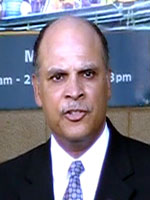 Ask
(then )UNC President Erskine Bowles,
Dr. Alan Mabe, Dr. Alton Thompson,
Dr. David H. Perrin, Dr. James Ryan
and NC A&T Chancellor Harold Martin,
where are NC A&T Nanoscience
degrees? Ask
(then )UNC President Erskine Bowles,
Dr. Alan Mabe, Dr. Alton Thompson,
Dr. David H. Perrin, Dr. James Ryan
and NC A&T Chancellor Harold Martin,
where are NC A&T Nanoscience
degrees? |
Doctor of Philosophy in Nanoscience
The PhD in Nanoscience requires a
minimum of 60 hours and is designed
to prepare students to take
positions in industrial,
governmental, or academic research
settings by providing a solid
background in Nanoscience theory and
experimental techniques through
course work and dissertation
research. |
|
|
|
|
|
| |
|
Examining
Nanoscience
discipline file at www.northcarolina.edu : |
 |
 |
|
1. The
discipline file
contained no UNCG
Notification to plan
a master’s in
Nanoscience,
2. The
discipline file
contained an unsigned “Revised
UNCG Request to
Establish a Master’s
in Nanoscience,
3. The
discipline file
contained no UNCG
Request to plan a
PhD in Nanoscience
4. The
discipline file
contained no UNCG
Request to
Established a PhD in
Nanoscience |
|
|
Early in the investigation of lack
of supporting documentation for UNCG
Nanoscience degree authorizations
Dr. James Sadler Associate Vice
President for Academic Planning
University of North Carolina put
forth a chronology of authorizations
(e-mail (08/04/2010). |
| |
May 11, 2007
Board of Governors authorizes
establishment of the Joint School of
Nanoscience and Nanoengineering. You
ask about any request to amend the
Joint School, but I am not aware of
any request, emphasis
added. |
| |
|
Dr. Sadler Chronology acknowledged
unsigned alleged
“Revised UNCG Request to Establish a
Master’s in Nanoscience dated Nov.
9, 2009 was JSNN Dean Jim
Ryan; |
|
| |
|
From: James C. Sadler < >
Date: Sun, Oct 11, 2009 at 10:07 AM
Subject: Re: Revised version of the Request to
Establish the Professional Master of Science in
Nanoscience degree program
To: James Ryan <j>
Cc: dhprrin@uncg.edu,
James C Petersen JCPETERS < >, altont@ncat.edu, kmurray@ncat.edu
Thanks, Jim. I'll confer with Alan about the
Ph.D. and whether anything is needed. Jim Sadler
James Ryan wrote:
Jim,
I have attached a revised version of the Request
to Establish for the Professional Master of
Science in Nanoscience. I have included the most
recent update of the JSNN Management Agreement
as well as revised figures on enrollment. I have
also provided additional explanation to address
questions that were asked during the
disciplinary committee review on Wednesday.
Please review and let me know if additional
information or clarification is needed.
Also, similar revisions are needed for the
Request to Establish the Ph.D. in Nanoscience.
Should I send the latest version of that
document to you as well? Thank you.
Jim
James C. Sadler, Ph.D. Associate
Vice President, Academic Planning
Interim Assoc. VP, Institutional Research &
Analysis UNC General Administration |
|
| |
|
Amended and
Restated Management Agreement |
|
 |
|
| |
| Pursuant Amended and Restated Management
Agreement curriculum approval Process JSNN Dean
Ryan alleged UNC Greensboro Revised Request to
establish Nanoscience MS should have been
submitted to UNC Greensboro for review and
approval through established curricular approval
process, not submitted directly to UNC General
Administration therefore
unauthorized. |
|
| |
November 13, 2009
UNC Board of Governors authorizes
the UNCG MS in Nanoscience based on
the revised request submitted. The
summary that went to the Board can
be viewed in the Planning Committee
pre-meeting materials at this
location: https://www.northcarolina.edu/bog/index.php. |
 |
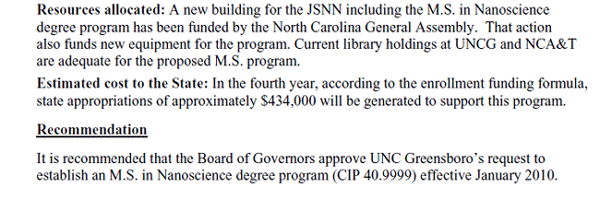 |
 |
|
|
May 2007 UNC
Board of
Governors
established
alleged Joint
School of
Nanoscience and
Nanoengineering,
at bogus NC A&T
/ UNCG Joint
Millennial
Campus, UNCG
Affiliate
Gateway
University
Research Park,
to offer (a)
joint
interdisciplinary
Ph.D. degree and
(a) joint
professional
science master's
degree. |
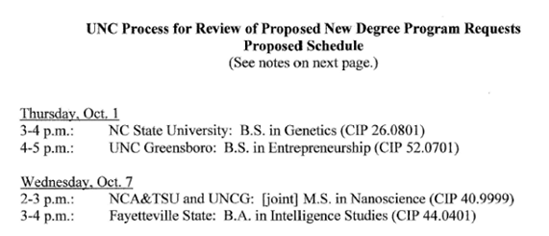 |
|
Memorandum to
Chief Academic
Officers from
Alan Mabe and
Jim Sadler,
Subject
Restating the
Academic program
Planning and
Evaluation
Process dated
September 21,
2009 proposed
schedule for
Wednesday, Oct.
7, 2009 included
entry NCA&TSU
and UNCG [joint]
M.S. in
Nanoscience CIP
40.999). |
| |
 |
| |
|
|
Alan Mabe Memorandum
dated March 18, 2010 to
Members, Committee on
Educational Planning,
Policies and Programs,
etc Subject Progress in
Reviewing Degree
Proposals indicated
UNCG: [joint JSNN] M. S.
in Nanoscience approved
by BOG Nov. 2009],
adding JSNN to the
degree and excluding
NCA&T. |
|
| |
|
January 8, 2010
UNC Board of Governors authorizes the UNCG PhD
in Nanoscience based on the revised request
submitted. The summary that went to the Board
can be viewed in the Planning Committee
pre-meeting materials at this location: https://www.northcarolina.edu/bog/index.php. |
|
|
|
|
|
|
|
{1]Nanobiotechnology Center of Innovation North Carolina
Biotechnology Center 20/11/2007 |
| {2] Jack
Scism TRIAD SCIENTIFIC RESEARCH CENTER:
VIABLE DREAM OR PIE IN THE SKY? , JACK SCISM, Greensboro
News & Record - Monday, July 20, 1992 . (emphasis added |
| [3] Request
to Establish NCA&T/UNCG Joint School of Nanoscience and
Nanoengineering March 5, 2007 |
| [4] (Jonnelle
Davis (Nano, money No.1 on A&T, UNC-G list News & Record
10.04.2010) |
| [5] UNC-G, A&T to seek $65M for
nanotech school, Matt Evans The Business Journal
Serving the Greater Triad Area, Nov 13, 2006 |
| [6] Jonnelle Davis (Nano, money No.1
on A&T, UNC-G list News & Record 10.04.2010 |
| [7] [Ken
Mayer, Editorial, UNCG, A&T University will need to be
leaders in the charge for high-tech industry in the
Triad, Triad Business Journal Nov 9, 1998] ( Ken Mayer
is former Chairman UNCG BOT 2003-2004 & 2004-2005 |
| |
| [9] UNCG
and NC A&T partner to create joint program in
nanotechnology, Sharlini Sankaran, October 8, 2007,
North Carolina Board of Science and Technology, http://www.ncnanotechnology.com/public/features/UNCG-NCAT.asp |
| [10] ]
High Research Activity The Scientist http://www.the-scientist.com/2007/03/01/s31/1/ |
| [11] |
| 12 [PCG/UNC-NCCS/UNC
Interim report3. doc/RB.SP.PC.CR.Atpcc.I /CC.14/10May05
page 109] |
|
 Throw in with the devil, get thrown in with the devil;
Never-Trump
Throw in with the devil, get thrown in with the devil;
Never-Trump
 " I
am so energized by the potential of this research
park, in particular the joint schools of nano
technology and nano science. The world is seeing
explosive growth today in the commercialization of
nanotechnology. We will have all of the assets right
here in Guilford County that we need to participate
in that explosion, and they will be right here at the Gateway
University Research Park." said Erskine president
of the University of North Carolina system. Photo NC
A&T
" I
am so energized by the potential of this research
park, in particular the joint schools of nano
technology and nano science. The world is seeing
explosive growth today in the commercialization of
nanotechnology. We will have all of the assets right
here in Guilford County that we need to participate
in that explosion, and they will be right here at the Gateway
University Research Park." said Erskine president
of the University of North Carolina system. Photo NC
A&T  Bowles
appointee Interim NC A&T Chancellor Lloyd V. Hackley and
UNCG Chancellor made Request to Establish The JSNN
March 7, 2007.
Bowles
appointee Interim NC A&T Chancellor Lloyd V. Hackley and
UNCG Chancellor made Request to Establish The JSNN
March 7, 2007.
 No statuary NCGS:
116-198.34. (8b) NC A&T/ UNCG Joint
Millennial Campus was designated Oct.
2003 enabling Greensboro Center for Innovative Development, Inc.
to administer the educational, research, and economic
development mission of a Joint Millennial Campus. No
lawful leased was executed by Board of Governors to the
Greensboro Center for Innovative Development, Inc. for
Session Law 2003-284, Section 6.20, land and facilities and 75-acre
parcel of NC A&T Farmland.
Link
No statuary NCGS:
116-198.34. (8b) NC A&T/ UNCG Joint
Millennial Campus was designated Oct.
2003 enabling Greensboro Center for Innovative Development, Inc.
to administer the educational, research, and economic
development mission of a Joint Millennial Campus. No
lawful leased was executed by Board of Governors to the
Greensboro Center for Innovative Development, Inc. for
Session Law 2003-284, Section 6.20, land and facilities and 75-acre
parcel of NC A&T Farmland.
Link


 Unambiguous
no statuary NCGS:
116-198.34. (8b) NC A&T/ UNCG Joint
Millennial Campus was designated Oct.
2003 enabling Greensboro Center for Innovative Development, Inc.
to administer the educational, research, and economic
development mission of a Joint Millennial Campus. No
lawful leased was executed by Board of Governors to the
Greensboro Center for Innovative Development, Inc. for
Session Law 2003-284, Section 6.20, land and facilities and 75-acre
parcel of NC A&T Farmland.
Link
Unambiguous
no statuary NCGS:
116-198.34. (8b) NC A&T/ UNCG Joint
Millennial Campus was designated Oct.
2003 enabling Greensboro Center for Innovative Development, Inc.
to administer the educational, research, and economic
development mission of a Joint Millennial Campus. No
lawful leased was executed by Board of Governors to the
Greensboro Center for Innovative Development, Inc. for
Session Law 2003-284, Section 6.20, land and facilities and 75-acre
parcel of NC A&T Farmland.
Link Historical
Black Land Grant NC A&T was listed as University focus on
Nanotechnology May 2005.
Historical
Black Land Grant NC A&T was listed as University focus on
Nanotechnology May 2005.






 declined
to comment on the proposal because it had not yet been
presented to the A&T trustees. It must be approved by
both schools before it can be submitted to the UNC
General Administration for evaluation. “
declined
to comment on the proposal because it had not yet been
presented to the A&T trustees. It must be approved by
both schools before it can be submitted to the UNC
General Administration for evaluation. “

 Published
as "the
Published
as "the 

